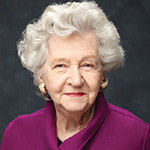October 15, 2019 — By Frances Kolarek —
By Frances Kolarek —
For years, Gloria Ericson supplied her fans here at Collington with columns about problems we encounter in our daily lives that brought us gales of laughter. Not aspirin, not pills to put us to sleep, not prescriptions to cure our many problems from cholesterol to constipation, but laughter, the best medicine.
In early September the community came together at a memorial service to say goodbye to Gloria who had succumbed to a long, drawn-out illness. And the occasion was marked by much laughter.
A column printed in the October 2005 Collingtonian is the best way to say goodbye to a valued friend with a rare gift.
Thanks for the Memories
By Gloria Ericson
It’s amazing how difficult it is to refer to myself as “old.” Instead I find myself saying things like, “Now that I’m older… .” The question immediately arises: Older than what? If a popular song talks about being “younger than springtime,” should the converse be “older than autumn”?
I once read that as we age we don’t see ourselves the way we really look — our egos assure us we look as we did at, say, 35. I decided to test that theory. I stared into the mirror and concentrated. It was like Dorian Gray: the longer I stared, the older I got. I stopped at 99 and tossed that theory into the same dustbin as the Flat Earth theory.
Actually I do think of myself as youngish but with elderly parts. It’s those pesky appendages that are failing — you know, the legs and feet, the neck and head, etc. The head is particularly important because it houses the brain, which in turn houses the memory cells. My memory cells have become unrepentant layabouts. I visualize them lounging around, feet on desks, indolently buffing their fingernails. And when I ask them to remind me of things, they just sneer at me. Apparently they belong to a tough union. Although in some things I have prevailed. For instance, I never forget to ask for dessert. Bananas are a different story.
I recently read an article on staving off memory loss. It said you must exercise your brain to keep it limber. It suggested crossword puzzles. Goody, I thought. I do crosswords. But, no, it must be a new activity — such as learning a new language or how to play an instrument. And don’t think you can dust off the piano your mother so cruelly made you practice on when you were 10. It must be a new instrument.
How about the euphonium? Too obscure, you say? Well, there’s the tuba. Too big to fit in your closet, you say? Don’t put it in your closet. Put some silk flowers in the wide end and display it as a novel planter. And won’t your guests be surprised and pleased when you toss aside the flowers and play a rousing rendition of “When the Saints Go Marching In” — followed by “Jingle Bells” and the other 15 pieces in your repertoire?
One thing I thought I would always have: my vocabulary. But time can erode that too. In conversation I often find myself searching for the perfect multisyllabic word that I know I know. Frantically I look through all my files. It is only when I find my conversational partner growing restless that I hastily send in a kindergarten word. That’s why I prefer writing: no pressure. I just wait patiently and soon the word comes sidling out of the shadows. I look up and smile. “Oh, there you are,” I say. “I’ve been waiting for you… .”
— From the October 2005 Collingtonian
________________
Let me know what you think. Drop me a line at [email protected].